Conference Presentations by Muhammad Muhammad Suleiman
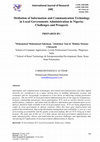
International Journal of Research (IJR) e-ISSN: 2348-6848 p-ISSN: 2348-795X , 2022
Information and communication technologies and related telecommunication and other digital networ... more Information and communication technologies and related telecommunication and other digital networks are considered to be a major driving force in building information societies and economies and are increasingly recognized as a new factor in improving existing governance practices. The use of ICT in local government administration has set the stage for transparency, inclusive relationship and greater citizen participation. ICTs such as wireless Internet service, mobile phones, computers, and online tools for effective information and communication service delivery should be made available in the local government areas. ICTs are being adopted more widely by local governments in African countries. Often they have gone hand-in-hand with political decentralisation. Improving information management and availability is seen as a way of increasing accountability and the quality of decision-making. But are ICTs living up to their promise. The main aim of this text is to help citizens and local government administrators to make informed policy choices and understand the practical challenges and opportunities that introducing ICT applications in local government administration in Nigeria.
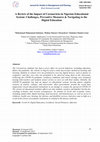
Journal for Studies in Management and Planning (Peer Reviewed Journal), 2022
The Coronavirus epidemic has had a severe effect on several industries, including education.
Befo... more The Coronavirus epidemic has had a severe effect on several industries, including education.
Before the pandemic, the schools in Nigeria used a solely face-to-face method of teaching and
learning. Students in schools were not permitted to own any digital devices, such as phones or
computers, and they were also not permitted to be observed using them in the classrooms.
Following the COVID-19 pandemic, lockdown conditions and school closings were instituted,
leaving both teachers and students unsure of how to carry on with their studies. Globally, the
COVID-19 pandemic has had an impact on educational systems, forcing almost complete
closures of schools, colleges, and universities. Most governments around the world have
temporarily closed educational institutions in an attempt to contain the spread of COVID-19.
The closure of educational institutes affects not only students, teachers and families but has farreaching economic and societal consequences. An amount of social and economic issues,
including student debt, digital learning, food insecurity, and homelessness, as well as access to
childcare, health care, housing, the internet, and disability services, had also come to light as a
result of the closure of academic institutions in rebuttal to the disease outbreak.
Keywords: Covid-19, Digital Education, Lockdown, Social Distances, Infection
It is evident that ICT has changed our lives and restructured the nature of daily doings. Where e... more It is evident that ICT has changed our lives and restructured the nature of daily doings. Where education plays an important role in who we are and what we can realize in our time, Learning has intensely transformed over recent years when globalization has brought different opportunities to learn with the Internet. In Today's era where the Computer becomes one of the pillars of the learning system, the education system is facing challenges respective to resource availability, cost control and storage handling. Cloud Computing is introduced as an alternative solution to overcome these challenges.
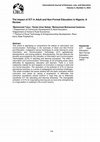
This article is attempting to comprehend the effects of Information and Communication Technology ... more This article is attempting to comprehend the effects of Information and Communication Technology in the exercises of Adult and Non-Formal and Education. It diagrams various techniques to confer training by using Information and Communication Technology (ICT) apparatuses, developments, and arising patterns. Simultaneously, this text features the benefits accumulated by the utilization of Information and Communication Technologies (ICTs) in teaching and learning processes. The effect of Information and Communication Technology on all schooling areas raises difficulties for legislatures, educators and learners. There is a more noteworthy interest for and reception of innovation in training in adult and non-formal education. The realization of the potential of ICTs to improve educational practices is a series of pedagogical and practical challenges. This article considers the issues starting with the basic motivation behind instruction and closes by raising a progression of difficulties that instructive foundations should confront in case they are to effectively coordinate ICT into educating and learning rehearses. The inescapable utilization of ICTs for long-lasting learning just as local area strengthening is a huge pattern in realizing in the current century.
This review is viewed as a piece of the logical endeavours to recognize and fathom the role of In... more This review is viewed as a piece of the logical endeavours to recognize and fathom the role of Information and Communication Technology, its importance and various devices and how we can extend the impact of this new innovation considering the idea of the knowledge society and how to utilize ICT for local area advancement. The main finding of this review is that the utilization of ICT plays a major part in our provincial networks, colleges and schools; it gives new methodical standards to local area improvement. Community development is a cycle where local area individuals are upheld by organizations to recognize and make an aggregate move on issues that are imperative to them. Community development engages community members and makes more grounded and more associated networks.
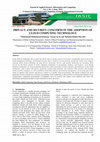
In the field of computing, data security has always been a serious concern. It becomes considerab... more In the field of computing, data security has always been a serious concern. It becomes considerably more severe in the cloud-computing technology environment because data is stored in several locations around the world. Users' biggest concerns about cloud technology are data privacy protection. Privacy and security protection are becoming more crucial for the future growth of cloud computing technology in government, industry, and business, even though numerous techniques on cloud computing themes have been researched in both academics and industries. In the cloud architecture, data security and privacy protection concern both hardware and software. This research will examine various security strategies, as well as problems from both software and hardware perspectives, for securing data in the cloud, to improve data security and privacy control in a reliable cloud environment. The article examines the most important security and privacy concerns surrounding cloud computing as they pertain to outsourcing elements of an organization's computing environment. It highlights areas of concern that require extra attention and offers the underlying information needed to make informed security decisions.
It is evident that ICT has changed our lives and restructured the nature of daily doings. Where e... more It is evident that ICT has changed our lives and restructured the nature of daily doings. Where education plays an important role in who we are and what we can realize in our time, Learning has intensely transformed over recent years when globalization has brought different opportunities to learn with the Internet. In Today's era where the Computer becomes one of the pillars of the learning system, the education system is facing challenges respective to resource availability, cost control and storage handling. Cloud Computing is introduced as an alternative solution to overcome these challenges.
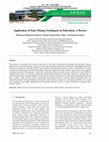
Data mining is the process that analyzes large data to find fresh and unknown information that in... more Data mining is the process that analyzes large data to find fresh and unknown information that increases industry productivity. In the field of trying, to discover novel and potentially suitable data, DM also be called KDD (Knowledge Discovery in Databases). Currently, DM has been introduced with educational settings, which is called EDM, it is an area of systematic analysis focused on the improvement of discovery approaches in the exclusive types of facts from academic situations and using this approach to effectively understood learners and the settings wherein they learn. EDM is emerging that focuses on analyzing educational data to develop models for improving experiences and efficiency in teaching and learning. Growing popularity in DM and the system of education is transforming educational data mining into a modern, rising research culture. Educational data mining involves removing hidden knowledge from vast educational datasets utilizing techniques and resources such as sorting, decision tree, clustering algorithms, etc. to create novel methods of knowledge exploration from educational databases, which is used for educational assessment which decision-making.
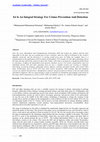
Over the years, Information and Communication Technology (ICT) has turned our cultures and has be... more Over the years, Information and Communication Technology (ICT) has turned our cultures and has been impossible in the past, into an essential part of one's existence. And over half of civilization in the world is digitally connected, and the direction it is moving would grow more. In India, for example, there is a transformation in the application of ICT in almost all disciplines. ICT, though, not only offers advantages but at the same time has risks in the context of cybercrime. Today, cybercrime is growing as a significant global threat in cyberspace. It affects all stakeholders from agencies, business sectors, civil society organizations, and even individual citizens. ICT and other emerging tools are now a valuable resource for reacting to criminals, intervening in policing hotspots, addressing serious offenses, tracking personnel morale, and several other tasks. Technologies such as CCTV, ICT tools, heat control, biometrics, GPS tracking, Web and telephone services are used for the deterrence, identification, analysis, and prosecution of violence in the law enforcement and defense industries. The text suggested that a range of strategies for identifying and stopping crime based on the usage of ICT-related devices such as CCTV, GPS, surveillance systems, etc. could be widely implemented.
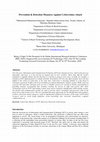
Over the years, Information and Communication Technology (ICT) has changed our lives, which in th... more Over the years, Information and Communication Technology (ICT) has changed our lives, which in the past was impossible, and more so it has become an integral part of one's existence. More than half the world's population is digitally linked, and the direction it is moving is going to grow more. In India, for example, a transition of ICT implementation in virtually all fields. Nevertheless, ICT not only offers benefits, but it also has pitfalls in the context of cybercrime, at the same time. Cybercrime is emerging globally as a big threat in cyberspace at present. It affects all actors including government departments, industry groups, NGOs, and even a person. ICT and other emerging tools are now a valuable resource for reacting to threats, participating in patrolling hotspots, investigating hate incidents, tracking the success of staff, and several other tasks. Technologies such as CCTV, data mining systems, heat sensors, biometric identification, GPS tracking systems, the internet and communication systems are used to prevent, detect, investigate and prosecute crime in the police forces and security sector. The text concluded that many approaches for the identification and avoidance of these cybercrime attacks among us could be implemented satisfactorily because of the usage of ICT-based resources such as social media platforms, social networking sites, electronic transactions, computer collaborations, etc.
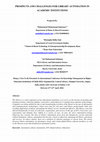
The library is a vital component of any educational institution, as it serves as the nucleus of t... more The library is a vital component of any educational institution, as it serves as the nucleus of teaching and learning activities, allowing students, researchers, and professors to examine large amounts of knowledge. Computers are being utilised for day-today housekeeping activities of the library in the age of information and communications technologies, which saves time for end users and library professionals while also avoiding duplication of labour and making the library service smooth and effective. The library scene has altered dramatically in terms of collection, organisation, and services in the age of ICT. Conversely, user expectations and attitudes have shifted in a variety of ways. In turn, the user's information-seeking behaviour has evolved. The idea of Library Automation arose from the demand for current materials without limitations. Library automation has become critical to effectively managing all library operations and services. In today's market, there are a plethora of software packages to choose from. The article discusses library automation, its advantages, needs, and certain digital library software products, as well as the libraries areas that benefit from automated systems.
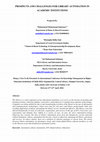
The library is a vital component of any educational institution, as it serves as the nucleus of t... more The library is a vital component of any educational institution, as it serves as the nucleus of teaching and learning activities, allowing students, researchers, and professors to examine large amounts of knowledge. Computers are being utilised for day-today housekeeping activities of the library in the age of information and communications technologies, which saves time for end users and library professionals while also avoiding duplication of labour and making the library service smooth and effective. The library scene has altered dramatically in terms of collection, organisation, and services in the age of ICT. Conversely, user expectations and attitudes have shifted in a variety of ways. In turn, the user's information-seeking behaviour has evolved. The idea of Library Automation arose from the demand for current materials without limitations. Library automation has become critical to effectively managing all library operations and services. In today's market, there are a plethora of software packages to choose from. The article discusses library automation, its advantages, needs, and certain digital library software products, as well as the libraries areas that benefit from automated systems.
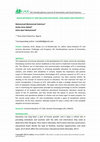
KIU Interdisciplinary Journal of Humanities and Social Sciences
The importance of inclusive education in the development of a nation cannot be overstated. Develo... more The importance of inclusive education in the development of a nation cannot be overstated. Developing countries face several roadblocks as they work to implement Inclusive Education (IE). The effective use of information and communication technologies (ICT) in developing countries will assist governments in achieving equitable education by assisting women, orphans, and children with disabilities in schools. Despite the importance and positive impact of Information Communication Technologies (ICT), previous research on ICT's use in inclusive education, particularly in developing countries, has been severely limited. By alluding to the concept of Universal Access to Education, this text examines the topic of school consideration. It focuses on ICTs' solid ability to keep a strategic distance from any form of separation among understudies. The paper also claims that educators play a critical role in maximizing the opportunities provided by emerging technology to aid the complete integration of all students into traditional educational frameworks. Educators should be aware of the ICT potentials, and they should have the option to secure the necessary information and operational abilities to choose and use these types of assets properly. For the current social orders, ICT and consideration provide a space of exceptional rational enthusiasm. At this time, teachers' attitudes toward ICT play a critical role in the complete adoption of Inclusive Education.
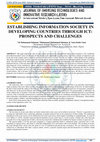
This paper depicts the idea of data society and its part in non-industrial nations and recognizes... more This paper depicts the idea of data society and its part in non-industrial nations and recognizes a few worldwide prescribed procedures issues on the topic for the country to be considered as a data society state. Data assumes an imperative part in our day to day routines and is crucial for each person and society to create. The idea of "society," which alludes to the gathering who share a typical culture, involves a specific regional region, and are heavily influenced by a brought together element, was talked about. The latest thing of the Information Age and Globalization prompted the development of the Information Society, or Post Industrial Society, in the late nineteenth 100 years, where data assumes an imperative part in all pieces of human existence, going from financial, social, mechanical, spatial, and social exercises through the main impetus of data and correspondence advances (ICTs). Various hypotheses have been proposed by researchers and masterminds to characterize and portray the fate of a decent data society. The nature and level of a data society in emerging nations isn't following worldwide best practices contrasted with created nations. This is because of some innovative, social, social, political, and other natural issues. Be that as it may, potential proposals were featured to accomplish the top regarding worldwide best practices in data society by the agricultural countries.
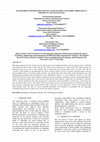
Uttunga-A The Students Research Forum, School of Computer Science and Information Technology, Jain (Deemed-To-Be University),, 2022
This paper depicts the idea of data society and its part in non-industrial nations and recognizes... more This paper depicts the idea of data society and its part in non-industrial nations and recognizes a few worldwide
prescribed procedures issues on the topic for the country to be considered as a data society state. Data assumes an
imperative part in our day to day routines and is crucial for each person and society to create. The idea of
"society," which alludes to the gathering who share a typical culture, involves a specific regional region, and are
heavily influenced by a brought together element, was talked about. The latest thing of the Information Age and
Globalization prompted the development of the Information Society, or Post Industrial Society, in the late
nineteenth 100 years, where data assumes an imperative part in all pieces of human existence, going from financial,
social, mechanical, spatial, and social exercises through the main impetus of data and correspondence advances
(ICTs). Various hypotheses have been proposed by researchers and masterminds to characterize and portray the
fate of a decent data society. The nature and level of a data society in emerging nations isn't following worldwide
best practices contrasted with created nations. This is because of some innovative, social, social, political, and
other natural issues. Be that as it may, potential proposals were featured to accomplish the top regarding
worldwide best practices in data society by the agricultural countries.
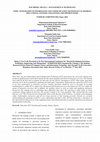
Uttunga-A The Students Research Forum, School of Computer Science and Information Technology, Jain (Deemed-To-Be University), Bengaluru, Karnataka State, India, B, 2022
These days, the job of Information and Communication Technology (ICT), particularly the web in th... more These days, the job of Information and Communication Technology (ICT), particularly the web in the training area, assumes a significant part, particularly during the time spent engaging innovation in instructive exercises. The training area could be the best area to prepare for and wipe out the adverse consequences of ICT. Then again, innovation (the web) can be the best method for expanding the understudy's information. Monitoring the critical job of ICT (web) in our lives, particularly in instructive exercises, training specialists should be savvy to the point of executing methodologies to enable ICT to support the educational and learning process in the homeroom. ICT isn't simply the sprout of instructive exercises, but in addition, the auxiliary choice to work on viable and significant instructive interaction. The training area is confronting many difficulties these days. We experience a daily reality in which continuous changes happen in all areas. The greatest example is the crown pandemic. Who realized that this could likewise occur? The Coronavirus has changed the entire world. Because of the lockdown, everybody is telecommuting online. Understudies, instructors, and all are trying sincerely so that learning proceeds. Schools are currently acknowledging the advantages of ICT to convey information and data to kids. ICT has turned into a centerpiece of the educational learning process. It has supplanted slates with whiteboards and executed the utilization of an advanced smartboard for instructing.
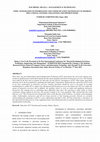
These days, the job of Information and Communication Technology (ICT), particularly the web in th... more These days, the job of Information and Communication Technology (ICT), particularly the web in the training area, assumes a significant part, particularly during the time spent engaging innovation in instructive exercises. The training area could be the best area to prepare for and wipe out the adverse consequences of ICT. Then again, innovation (the web) can be the best method for expanding the understudy's information. Monitoring the critical job of ICT (web) in our lives, particularly in instructive exercises, training specialists should be savvy to the point of executing methodologies to enable ICT to support the educational and learning process in the homeroom. ICT isn't simply the sprout of instructive exercises, but in addition, the auxiliary choice to work on viable and significant instructive interaction. The training area is confronting many difficulties these days. We experience a daily reality in which continuous changes happen in all areas. The greatest example is the crown pandemic. Who realized that this could likewise occur? The Coronavirus has changed the entire world. Because of the lockdown, everybody is telecommuting online. Understudies, instructors, and all are trying sincerely so that learning proceeds. Schools are currently acknowledging the advantages of ICT to convey information and data to kids. ICT has turned into a centerpiece of the educational learning process. It has supplanted slates with whiteboards and executed the utilization of an advanced smartboard for instructing.
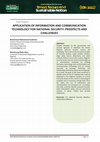
International Conference on Smart, Secure and Sustainable Nation | S3N’2022 NIGERIA COMPUTER SOCIETY, 2022
Despite attempts by the government and
security agencies to eliminate the threat,
Nigerian nation... more Despite attempts by the government and
security agencies to eliminate the threat,
Nigerian national security worries are
escalating. This is due to the increased number
of terrorist attacks, cattle rustlers, herders,
Niger delta terrors, abductions, and other
criminal offences across the country. Nigeria's
security issues must be revived and brought up
to international standards by utilising
innovative technology such as Information and
Communication Technology (ICT) to combat
insecurity by tracking, detecting, and
distributing information about terrorist groups.
As a result, the goal of this study would be to
identify some of the ICT facilities that could be
employed in the Nigerian situation to control
insecurity based on the country's technological
condition and, if necessary, foreign help. Since
the 1980s, the use of information and
communication has increased. ICT, in notably,
may help countries identify potential hazards,
share information easily, and put preventive
systems in place. Create and provide
experience.
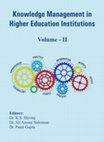
Manipal University Jaipur Dehmi Kalan, Jaipur -303007, Rajasthan, India, 2022
The library is a vital component of any educational institution, as it serves as the
nucleus of t... more The library is a vital component of any educational institution, as it serves as the
nucleus of teaching and learning activities, allowing students, researchers, and professors to
examine large amounts of knowledge. Computers are being utilised for day-to-day housekeeping
activities of the library in the age of information and communications technologies, which saves
time for end users and library professionals while also avoiding duplication of labour and making
the library service smooth and effective. The library scene has altered dramatically in terms of
collection, organisation, and services in the age of ICT. Conversely, user expectations and
attitudes have shifted in a variety of ways. In turn, the user’s information-seeking behaviour has
evolved. The idea of Library Automation arose from the demand for current materials without
limitations. Library automation has become critical to effectively managing all library operations
and services. In today’s market, there is a plethora of software packages to choose from. The
article discusses library automation, its advantages, needs, and certain digital library software
products, as well as the libraries areas that benefit from automated systems.
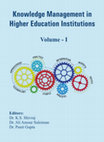
Manipal University Jaipur Dehmi Kalan, Jaipur -303007, Rajasthan, India, 2022
As the world moves towards a knowledge-based economy, knowledge is being considered as the main d... more As the world moves towards a knowledge-based economy, knowledge is being considered as the main driver of this new economy. The ability to manage knowledge is becoming
increasingly more crucial in today’s knowledge economy. The importance of knowledge management (KM) has been widely recognized as the foundations of industrialized economies
shifted from natural resources to intellectual assets. KM is a new immerging field in the academic
environment. This paper reviews literature in the area of knowledge management to bring out its
importance in organizations particularly Education institutions to survive competitive advantage
and attain the global best practice in academic activities. The major aim of knowledge
management in an organization is to either create new knowledge or exploit and manage existing
knowledge that is important for an organization. This paper contributes to effective knowledge
management practice which includes knowledge creation, processing, organizing, storage, use,
sharing and dissemination is the major responsibilities of academics. Institutions of higher
learning are knowledge production organizations where the management and sharing of
knowledge are viewed as a natural activity to meet their objectives that are teaching, learning and
research. It can only be successful by connecting people, processes and technology as an enabler
for leveraging knowledge

Uploads
Conference Presentations by Muhammad Muhammad Suleiman
Before the pandemic, the schools in Nigeria used a solely face-to-face method of teaching and
learning. Students in schools were not permitted to own any digital devices, such as phones or
computers, and they were also not permitted to be observed using them in the classrooms.
Following the COVID-19 pandemic, lockdown conditions and school closings were instituted,
leaving both teachers and students unsure of how to carry on with their studies. Globally, the
COVID-19 pandemic has had an impact on educational systems, forcing almost complete
closures of schools, colleges, and universities. Most governments around the world have
temporarily closed educational institutions in an attempt to contain the spread of COVID-19.
The closure of educational institutes affects not only students, teachers and families but has farreaching economic and societal consequences. An amount of social and economic issues,
including student debt, digital learning, food insecurity, and homelessness, as well as access to
childcare, health care, housing, the internet, and disability services, had also come to light as a
result of the closure of academic institutions in rebuttal to the disease outbreak.
Keywords: Covid-19, Digital Education, Lockdown, Social Distances, Infection
prescribed procedures issues on the topic for the country to be considered as a data society state. Data assumes an
imperative part in our day to day routines and is crucial for each person and society to create. The idea of
"society," which alludes to the gathering who share a typical culture, involves a specific regional region, and are
heavily influenced by a brought together element, was talked about. The latest thing of the Information Age and
Globalization prompted the development of the Information Society, or Post Industrial Society, in the late
nineteenth 100 years, where data assumes an imperative part in all pieces of human existence, going from financial,
social, mechanical, spatial, and social exercises through the main impetus of data and correspondence advances
(ICTs). Various hypotheses have been proposed by researchers and masterminds to characterize and portray the
fate of a decent data society. The nature and level of a data society in emerging nations isn't following worldwide
best practices contrasted with created nations. This is because of some innovative, social, social, political, and
other natural issues. Be that as it may, potential proposals were featured to accomplish the top regarding
worldwide best practices in data society by the agricultural countries.
security agencies to eliminate the threat,
Nigerian national security worries are
escalating. This is due to the increased number
of terrorist attacks, cattle rustlers, herders,
Niger delta terrors, abductions, and other
criminal offences across the country. Nigeria's
security issues must be revived and brought up
to international standards by utilising
innovative technology such as Information and
Communication Technology (ICT) to combat
insecurity by tracking, detecting, and
distributing information about terrorist groups.
As a result, the goal of this study would be to
identify some of the ICT facilities that could be
employed in the Nigerian situation to control
insecurity based on the country's technological
condition and, if necessary, foreign help. Since
the 1980s, the use of information and
communication has increased. ICT, in notably,
may help countries identify potential hazards,
share information easily, and put preventive
systems in place. Create and provide
experience.
nucleus of teaching and learning activities, allowing students, researchers, and professors to
examine large amounts of knowledge. Computers are being utilised for day-to-day housekeeping
activities of the library in the age of information and communications technologies, which saves
time for end users and library professionals while also avoiding duplication of labour and making
the library service smooth and effective. The library scene has altered dramatically in terms of
collection, organisation, and services in the age of ICT. Conversely, user expectations and
attitudes have shifted in a variety of ways. In turn, the user’s information-seeking behaviour has
evolved. The idea of Library Automation arose from the demand for current materials without
limitations. Library automation has become critical to effectively managing all library operations
and services. In today’s market, there is a plethora of software packages to choose from. The
article discusses library automation, its advantages, needs, and certain digital library software
products, as well as the libraries areas that benefit from automated systems.
increasingly more crucial in today’s knowledge economy. The importance of knowledge management (KM) has been widely recognized as the foundations of industrialized economies
shifted from natural resources to intellectual assets. KM is a new immerging field in the academic
environment. This paper reviews literature in the area of knowledge management to bring out its
importance in organizations particularly Education institutions to survive competitive advantage
and attain the global best practice in academic activities. The major aim of knowledge
management in an organization is to either create new knowledge or exploit and manage existing
knowledge that is important for an organization. This paper contributes to effective knowledge
management practice which includes knowledge creation, processing, organizing, storage, use,
sharing and dissemination is the major responsibilities of academics. Institutions of higher
learning are knowledge production organizations where the management and sharing of
knowledge are viewed as a natural activity to meet their objectives that are teaching, learning and
research. It can only be successful by connecting people, processes and technology as an enabler
for leveraging knowledge
Before the pandemic, the schools in Nigeria used a solely face-to-face method of teaching and
learning. Students in schools were not permitted to own any digital devices, such as phones or
computers, and they were also not permitted to be observed using them in the classrooms.
Following the COVID-19 pandemic, lockdown conditions and school closings were instituted,
leaving both teachers and students unsure of how to carry on with their studies. Globally, the
COVID-19 pandemic has had an impact on educational systems, forcing almost complete
closures of schools, colleges, and universities. Most governments around the world have
temporarily closed educational institutions in an attempt to contain the spread of COVID-19.
The closure of educational institutes affects not only students, teachers and families but has farreaching economic and societal consequences. An amount of social and economic issues,
including student debt, digital learning, food insecurity, and homelessness, as well as access to
childcare, health care, housing, the internet, and disability services, had also come to light as a
result of the closure of academic institutions in rebuttal to the disease outbreak.
Keywords: Covid-19, Digital Education, Lockdown, Social Distances, Infection
prescribed procedures issues on the topic for the country to be considered as a data society state. Data assumes an
imperative part in our day to day routines and is crucial for each person and society to create. The idea of
"society," which alludes to the gathering who share a typical culture, involves a specific regional region, and are
heavily influenced by a brought together element, was talked about. The latest thing of the Information Age and
Globalization prompted the development of the Information Society, or Post Industrial Society, in the late
nineteenth 100 years, where data assumes an imperative part in all pieces of human existence, going from financial,
social, mechanical, spatial, and social exercises through the main impetus of data and correspondence advances
(ICTs). Various hypotheses have been proposed by researchers and masterminds to characterize and portray the
fate of a decent data society. The nature and level of a data society in emerging nations isn't following worldwide
best practices contrasted with created nations. This is because of some innovative, social, social, political, and
other natural issues. Be that as it may, potential proposals were featured to accomplish the top regarding
worldwide best practices in data society by the agricultural countries.
security agencies to eliminate the threat,
Nigerian national security worries are
escalating. This is due to the increased number
of terrorist attacks, cattle rustlers, herders,
Niger delta terrors, abductions, and other
criminal offences across the country. Nigeria's
security issues must be revived and brought up
to international standards by utilising
innovative technology such as Information and
Communication Technology (ICT) to combat
insecurity by tracking, detecting, and
distributing information about terrorist groups.
As a result, the goal of this study would be to
identify some of the ICT facilities that could be
employed in the Nigerian situation to control
insecurity based on the country's technological
condition and, if necessary, foreign help. Since
the 1980s, the use of information and
communication has increased. ICT, in notably,
may help countries identify potential hazards,
share information easily, and put preventive
systems in place. Create and provide
experience.
nucleus of teaching and learning activities, allowing students, researchers, and professors to
examine large amounts of knowledge. Computers are being utilised for day-to-day housekeeping
activities of the library in the age of information and communications technologies, which saves
time for end users and library professionals while also avoiding duplication of labour and making
the library service smooth and effective. The library scene has altered dramatically in terms of
collection, organisation, and services in the age of ICT. Conversely, user expectations and
attitudes have shifted in a variety of ways. In turn, the user’s information-seeking behaviour has
evolved. The idea of Library Automation arose from the demand for current materials without
limitations. Library automation has become critical to effectively managing all library operations
and services. In today’s market, there is a plethora of software packages to choose from. The
article discusses library automation, its advantages, needs, and certain digital library software
products, as well as the libraries areas that benefit from automated systems.
increasingly more crucial in today’s knowledge economy. The importance of knowledge management (KM) has been widely recognized as the foundations of industrialized economies
shifted from natural resources to intellectual assets. KM is a new immerging field in the academic
environment. This paper reviews literature in the area of knowledge management to bring out its
importance in organizations particularly Education institutions to survive competitive advantage
and attain the global best practice in academic activities. The major aim of knowledge
management in an organization is to either create new knowledge or exploit and manage existing
knowledge that is important for an organization. This paper contributes to effective knowledge
management practice which includes knowledge creation, processing, organizing, storage, use,
sharing and dissemination is the major responsibilities of academics. Institutions of higher
learning are knowledge production organizations where the management and sharing of
knowledge are viewed as a natural activity to meet their objectives that are teaching, learning and
research. It can only be successful by connecting people, processes and technology as an enabler
for leveraging knowledge
examined in this chapter. Despite the unique nature of the virtual classroom,
many of the same aspects that are critical to the success of a traditional
classroom management plan are also applicable in the virtual classroom.
However, the teacher must be mindful of potential stumbling blocks such as
rule complacency, non-traditional student requirements, and feelings of
isolation, which may be magnified in a virtual mode environment, and
devise preventive classroom management strategies effectively. This
research explains how, with the right preventive management methods in
place, the virtual classroom environment can be just as rich and effective as a
traditional classroom. Today's newest and most popular kind of virtual
instruction is the virtual classroom. It has had a significant impact on higher
education over the last decade, and the tendency is only expected to
continue.